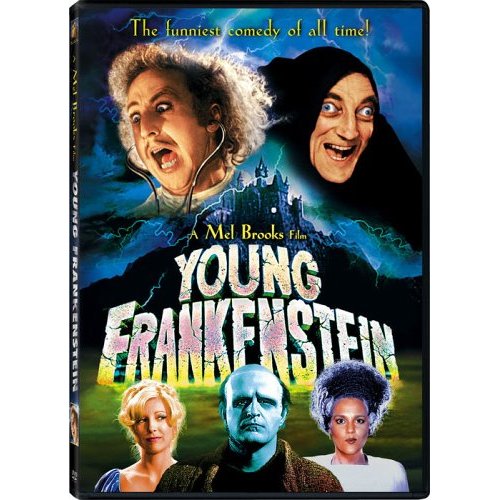Fashionably Late: Exercises in Critical Time Travel
Mel Brooks’ “Young Frankenstein”
May 29, 2011
Published: October 25, 2007
It is very rare that a spoof, such as Mel Brooks’ “Young Frankenstein”, ever has the same prestige as its original source material. Filmed in the same castle as the James Whale classic, the 1974 comedy is adapted from the text of the Mary Shelley novel, rather than the script of the original film. Brooks is sensitive to the fact that the two originals are esteemed classics; he adheres to their serious themes (many lines in the script are verbatim from the originals), and rather than attack their content, Brooks simply adds a twist of witty humor to the story.

Although Mel Brooks is credited with the film (I mean he DID direct it), much of the influence is in the hands of Gene Wilder. Wilder is not only the co-writer (actually original writer) of the film and brain behind the original idea, but he is also the star of the film. It would be tough to say that Wilder steals the show (especially with a cast including Marty Feldman, Peter Boyle, Cloris Leachman, Teri Garr and Madeline Kahn), but his acting is far superior. With supporting performances that are so over the top, Wilder is able to stand out as the only actor to embrace the seriousness of his character, and yet keep his line delivery appropriately foolish. It is in this sense that his performance is so remarkable. Wilder’s performance not only surpasses the acting expectations in a comedy (good actors are hard to find in comedies…especially nowadays), but it could also easily rank as one of the greatest performances of all time.
Wilder plays Doctor Frederick Frankenstein (pronounced Fronkenshteen), the grandson of the original Dr. Frankenstein who has inherited his grandfather’s Transylvanian castle. Although Frederick found his grandfather to be a “kook” and his work to be “doo-doo”, he returns to the family castle only to meet up with a cast of characters more kooky than his grandfather. He is assisted by the hunchbacked, bug-eyed Igor (pronounced eye-gor and played by Marty Feldman), the very attractive Inga (Terri Garr) and the sinister housekeeper Frau Bleucher, who is played by the always classic and always funny Cloris Leachman. Frederick sets out to recreate his grandfather’s monster, only to fall into the same traps (no thanks to Igor) when the monster accidentally receives the brain of “Abby Normal” rather than the acclaimed Hans Delbruck.
One of the most memorable scenes in the movie comes when the monster first awakes and attacks the scientist. In a classic example of the movie’s humor, the scene commences with a struggling Wilder who is trying to command his lab assistants to give the monster a sedative (or “seda-give” as Igor guesses during the game of charades that ensues).
The monster is played by Peter Boyle, who is a genius in the role, turning a horrific monster into a brain-dead, child-like goon. The monster is eventually subdued through the patronization of Wilder’s character into becoming more suitable for public appearance.
The movie’s signature scene comes when Frankenstein (who has accepted the true pronunciation of his name) presents his monster to an apprehensive crowded theater. What begins as a simple scientific demonstration finishes as a Fred Astaire-style musical number, in which the monster, with the help of his creator, dances and sings “Puiin on Da Reeez” (that would be Puttin’ on the Ritz—for those of you who haven’t seen the movie).
Sure this movie is funny (what am I saying? This movie is hysterical!), but it’s most amazing quality is the flawlessly written script. Each line is rich with a gag, a reference or a pun, and each scene is more unpredictable than the previous one. The humor is simple and clever, rather than explicit and raunchy. Many recent comedies contain very raunchy material; in many cases these movies are funny, but most lose there essence after the first time they are watched. The humor of “Young Frankenstein” allowed the film to become a classic because the movie is just as funny today as it was 30 years ago.
Brooks has released many movies since this classic, but none of them can escape comparison with “Young Frankenstein”. “Young Frankenstein” has thus become Brooks’ best work to date and clearly one of the most memorable comedies of all time. Don’t believe me? Rent it and watch it. You can even go over to 42nd Street and see the new musical version. Hell, if that doesn’t work for you, I’ll act out a scene or two for you.
The point is this isn’t a movie you should go on without seeing. To really appreciate good comedy, you need to see the best—“Young Frankenstein”.











